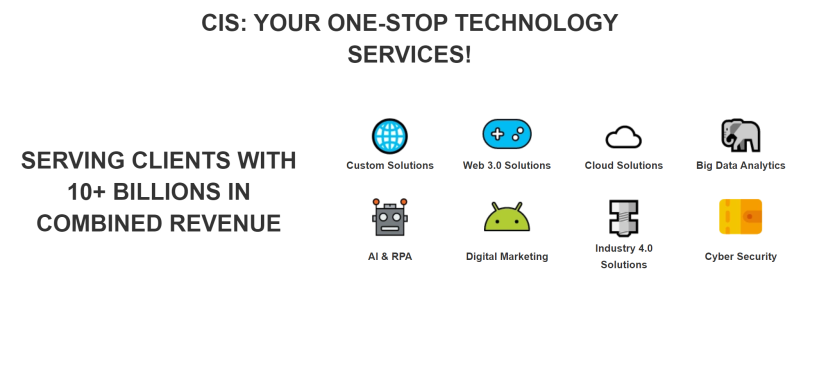Maximizing ROI: The Cost and Benefits of Adopting Salesforce For Financial Services for Your Business
- Salesforce for Financial services - Detailed Analysis by Enterprise Solutions Experts
Request A Free Consultation - Why Use Salesforce For Financial Services



Why Mid-size Companies and Enterprises needs Salesforce For Financial Services:
Salesforce for Financial Services provides mid-size companies and enterprises with a comprehensive suite of cloud-based solutions to help them manage their customer relationships, operations, marketing, and sales. It helps streamline processes, automate tasks, and increase efficiency. Salesforce also offers powerful analytics capabilities that enable organizations to gain insights into customer behavior and preferences so they can better target their efforts. Additionally, it provides real-time visibility into financial performance metrics such as revenue growth or churn rate. This allows organizations to make informed decisions about how best to allocate resources in order to maximize profitability.
Benefits of using Salesforce For Financial Services in Mid-size companies and Enterprises:
1. Enhanced customer experience:
Salesforce for Financial Services offers a unified platform to provide personalized services and insights, enabling customers to quickly access the information they need. This helps financial service providers build trust with their customers and foster stronger relationships.
2. Improved operational efficiency:
By leveraging Salesforce's cloud-based technology, companies can reduce manual processes and streamline operations across multiple departments such as compliance, risk management, customer service and marketing. Automating mundane tasks also frees up resources which can be used in other areas of the business where it is needed most.
3. Increased collaboration:
With Salesforce for Financial Services, teams have access to real-time data that enables them to collaborate more effectively across departments and locations while staying compliant with regulations like GDPR or MiFID II at all times.
4. Improved analytics capabilities:
Companies using Salesforce for Financial Services gain valuable insights into customer behavior through advanced analytics tools such as Einstein Analytics or Wave Analytics Cloud which help them make better decisions based on data-driven evidence rather than gut feeling alone .Detailed Features of Salesforce For Financial Services for Mid-size companies and Enterprises:
1. Automated Accounts Payable and Receivable:
Salesforce for Financial Services helps mid-size companies and enterprises automate their accounts payable and receivable processes, reducing manual data entry time while increasing accuracy.
2. Flexible Billing Management:
With Salesforce for Financial Services, businesses can easily manage customer billing cycles with flexible payment terms, discounts, and late fees to ensure timely payments.
3. Streamlined Cash Flow Management:
This solution provides an automated system that allows users to track cash flow in real-time across multiple bank accounts with one unified view of financial health.
4. Data Visualization Tools:
Leverage powerful visuals to quickly identify trends in sales performance or account receivables/payables within a single dashboard view of your business's financials from any device or location at any time.
5. Robust Reporting & Analytics:
Generate accurate reports on key metrics like revenue growth, profitability margins, expenses by category etc., enabling you to make informed decisions about the future direction of your business operations quickly and effectively .
6. Seamless Integration Capabilities :
Easily integrate Salesforce with other applications such as QuickBooks Online (QBO) or Xero accounting software for a streamlined experience that eliminates double data entry errors while providing access to up-to-date information anytime anywhereWho are the Users of Salesforce For Financial Services:
The customers using Salesforce for Financial Services include banks, credit unions, investment firms, insurance companies, and other financial institutions.
How to ensure Data Security and Compliance with Salesforce For Financial Services:
1. Enable data encryption:
Encrypting your sensitive Salesforce data is a must for ensuring its security and compliance with financial services regulations. Leverage Salesforce's native encryption capabilities to protect customer information, account numbers, payment details, and more.
2. Implement two-factor authentication:
Two-factor authentication adds an extra layer of security by requiring users to provide additional credentials beyond their username and password when logging in to the system. This helps prevent unauthorized access from malicious actors or hackers trying to gain access to your financial records stored on Salesforce.
3. Utilize role-based permissions:
Role-based permissions allow you to control who has access to which features within the application based on their job responsibilities and level of authorization needed for each task they perform in Salesforce for Financial Services applications.
4. Monitor user activity:
Monitoring user activity can help detect any suspicious behavior before it becomes a major issue that could potentially lead to a breach or other noncompliance issues with financial services regulations . Use audit logs in Salesforce, as well as third party tools like Splunk Enterprise Security (ES),to monitor users' activities across all applications connected through the platform .How Salesforce For Financial Services can increase organization Productivity, Agility, and Profitability:
Salesforce for Financial Services can increase organization productivity, agility, and profitability by providing a comprehensive suite of tools that enable financial services firms to automate processes, streamline customer interactions, and gain valuable insights into customer behavior. This includes features such as automated lead generation and nurturing, integrated CRM systems for tracking customers' data across multiple channels, advanced analytics for uncovering trends in customer behavior and preferences, machine learning algorithms to predict future outcomes based on past performance data points, and mobile apps tailored to the specific needs of each individual user. By leveraging these powerful capabilities through Salesforce's cloud-based platform organizations can quickly optimize their operations while also reducing costs associated with manual labor or inefficient processes. Additionally they will be able to provide more personalized services which further increases customer satisfaction levels leading to increased revenue opportunities over time.
How to Measure KPIs and increase Benefits of implementing Salesforce For Financial Services in Mid-size companies and Enterprises:
1. Establish baseline KPIs:
Before implementing Salesforce for Financial Services, it is important to establish baseline KPIs such as customer acquisition rate, customer retention rate, cost per acquisition (CPA), and average order value (AOV). This will allow you to measure the impact of the implementation over time.
2. Track user adoption rates:
Tracking user adoption rates can help identify areas where additional training or support may be needed to ensure successful usage of Salesforce for Financial Services by employees in mid-size companies and enterprises.
3. Monitor financial performance metrics:
Monitoring key financial performance metrics such as revenue growth, profitability margin, and return on investment (ROI) can provide insight into how well Salesforce for Financial Services is helping your business achieve its goals.
4. Analyze customer feedback:
Collecting and analyzing customer feedback can provide valuable insights into how customers are using Salesforce for Financial Services and whether they are satisfied with their experience. This information can then be used to improve the service offering or adjust pricing accordingly in order to maximize benefits from the implementation of Salesforce for Financial services in mid-size companies and enterprises .How Salesforce For Financial Services can increase Employee Morale in your organization:
Salesforce for Financial services can increase organization employee morale by providing a streamlined and efficient platform for employees to access customer data, track performance metrics, and collaborate on projects. Additionally, Salesforce has features such as gamification that allow employees to receive recognition for their work in the form of badges or rewards. This encourages positive behavior and increases motivation among employees. Finally, Salesforce also provides tools that make it easier for managers to recognize and reward top performers which further boosts morale.
How Salesforce For Financial Services is Better than its Competitors:
Salesforce for Financial Services offers a wide range of benefits that make it stand out from its competitors. It provides an integrated platform to manage customer relationships, financial data, and processes more efficiently. Its cloud-based architecture allows organizations to quickly scale their operations without the need for large investments in IT infrastructure. Salesforce also provides access to a variety of powerful analytics tools that allow businesses to gain better insights into customer behavior and trends. Additionally, Salesforce's robust security protocols help ensure compliance with industry regulations such as GDPR and PCI DSS. Finally, its comprehensive API library enables companies to easily integrate third-party applications into their existing systems for added functionality or customization.
Cost to Develop & Implemention of Salesforce For Financial Services:
The cost of developing and deploying a Salesforce for Financial Services solution will vary depending on the size and complexity of the project. Generally speaking, you can expect to pay anywhere from $50,000 to hundreds of thousands of dollars for custom development work. Additionally, there are subscription fees associated with using Salesforce services that range from $25/user/month up to several hundred dollars per user per month for enterprise-level solutions.
Why outsourcing implementation services for Salesforce For Financial Services is better for Mid-size companies and Enterprises:
Outsourcing implementation services for Salesforce for Financial Services can be beneficial to mid-size companies and enterprises because it allows them to access the expertise of experienced professionals who are familiar with the product. This means that they don't have to spend time and money training their own staff on how to use the software, which could take months or even years. Additionally, outsourcing implementation services can provide a cost-effective solution as these professionals will typically charge lower rates than hiring an in-house team. Moreover, when dealing with an outsourced provider, companies can also benefit from scalability-they only pay for what they need at any given moment without having to worry about long-term commitments or contracts.


